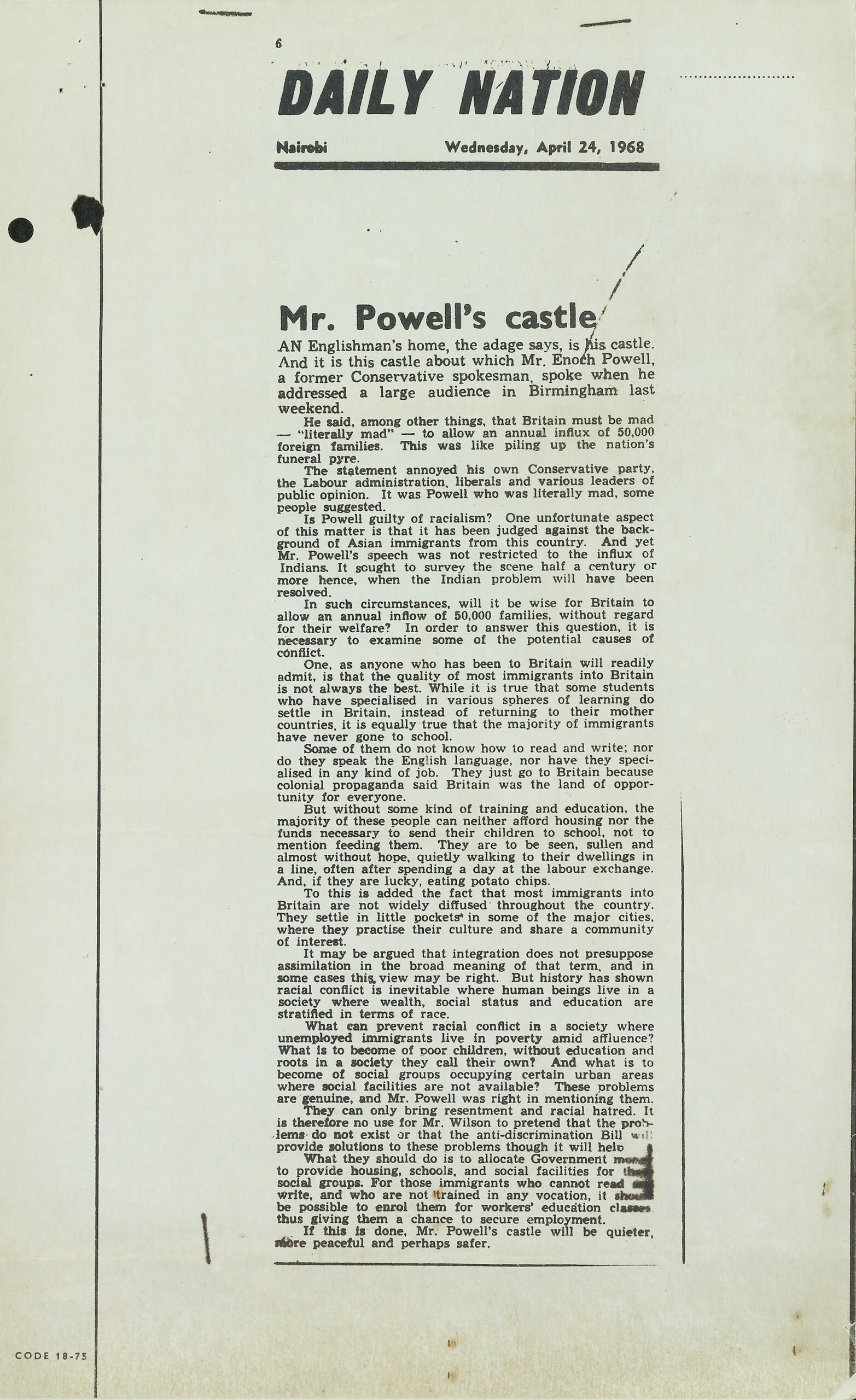
Copy of a press clipping from the newspaper called The Daily Nation, Nairobi, 24 April 1968.
The article refers to British Conservative MP Enoch Powell’s speech made in Birmingham on 20 April 1968. He strongly criticised Commonwealth immigration to the United Kingdom and the proposed Race Relations Bill. Catalogue ref: FCO 50/329
The speech was regarded as racialist in tone and highly inflammatory. Powell was dismissed from Edward Heath’s shadow cabinet as result.
- According to the article, what are roots of racial conflict?
- What steps are suggested to improve living and working conditions for immigrants?
- Why, according to the article, are anti-discrimination laws not enough on their own?
Transcript
DAILY NATION
Nairobi Wednesday, 24th April, 1968
AN Englishman’s home, the adage says, is his castle. And it is this castle about which Mr. Enoch Powell, a former Conservative spokesman, spoke when he addressed a large audience in Birmingham last weekend.
He said, among other things, that Britain must be mad- “literally mad”- to allow an annual influx of 50,000 foreign families. This was like piling up the nation’s funeral pyre.
The statement annoyed his own Conservative party, the Labour administration, liberal and various leaders of public opinion. It was Powell who was literally mad, some people suggested.
Is Powell guilty of racialism? One unfortunate aspect of this matter is that it has been judged against the background of Asian immigrants from this country. And yet Mr. Powell’s speech was not restricted to the influx of Indians. It sought to survey the scene half a century or more hence when the Indian problem will have been resolved.
In such circumstances, will it be wise for Britain to allow an annual flow of 50,000 families, without regard for their welfare? In order to answer this question, it is necessary to examine some of the potential causes of conflict.
One, as anyone who has been to Britain will readily admit, is that the quality of most immigrants into Britain is not always the best. While it is true that some students who have specialised in various spheres of learning do settle in Britain, instead of returning to their mother countries, it is equally true that the majority of immigrants have never gone to school.
Some of them do not know how to read or write; nor do they speak the English language, nor have they specialised in any kind of job. They just go to Britain because colonial propaganda said Britain was the land of opportunity for everyone.
But without some kind of training and education, the majority of these people can neither afford housing nor the funds necessary to send their children to school, not to mention feeding them. They are to be seen, sullen and almost without hope, quietly walking to their dwellings in a line, often spending a day at the labour exchange. And if they are lucky, eating potato chips.
To this is added the fact that most immigrants into Britain are not widely diffused throughout the country. They settle in little pockets in some of the major cities where they practice their culture and share a community of interest.
It may be argued that integration does not presuppose assimilation in the broad meaning of that term, and in some case this view may be right. But history has shown racial conflict is evitable where human beings live in a society where wealth, social status and education are stratified in terms of race.
What can prevent racial conflict in a society where unemployed immigrants live in poverty amid affluence? What is to become of poor children without education and roots in a society they call their own? And what is to become of social groups occupying certain urban areas where social facilities are not available? These problems are genuine, and Mr. Powell was right in mentioning them.
They can only bring resentment and racial hatred. It is therefore no use for Mr Wilson to pretend that the problem does not exist or that the anti-discrimination Bill will provide solutions to these problems though it will help.
What they should do is allocate Government to provide housing and social facilities for social groups. For those immigrants who cannot read, write, and are not trained in any vocation, it should be possible to enrol them for workers’ education classes thus giving them a chance to secure employment.
If this is done, Mr. Powell’s castle will be quieter, more peaceful and perhaps safer.
